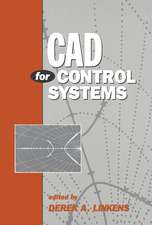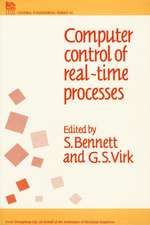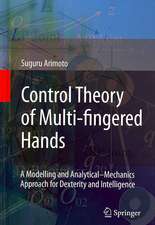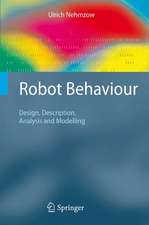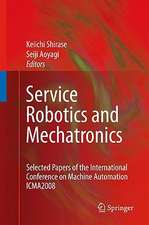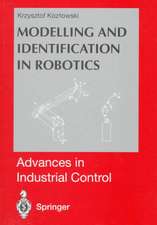Scientific Methods in Mobile Robotics: Quantitative Analysis of Agent Behaviour
Autor Ulrich Nehmzowen Limba Engleză Hardback – 18 noi 2005
This book is a step towards a theoretical understanding of the operation of autonomous mobile robots. It presents cutting-edge research on the application of chaos theory, parametric and non-parametric statistics and dynamical systems theory in this field. Practical examples and case studies show how robot behaviour can be logged, analysed, interpreted and modelled, aiding design of controllers, analysis of agent behaviour and verification of results.
As the first book to apply advanced scientific methods to mobile robots it will interest researchers, lecturers and post-graduate students in robotics, artificial intelligence and cognitive science.
| Toate formatele și edițiile | Preț | Express |
|---|---|---|
| Paperback (1) | 941.05 lei 43-57 zile | |
| SPRINGER LONDON – 13 oct 2010 | 941.05 lei 43-57 zile | |
| Hardback (1) | 945.62 lei 43-57 zile | |
| SPRINGER LONDON – 18 noi 2005 | 945.62 lei 43-57 zile |
Preț: 945.62 lei
Preț vechi: 1153.19 lei
-18% Nou
Puncte Express: 1418
Preț estimativ în valută:
180.95€ • 189.40$ • 150.60£
180.95€ • 189.40$ • 150.60£
Carte tipărită la comandă
Livrare economică 31 martie-14 aprilie
Preluare comenzi: 021 569.72.76
Specificații
ISBN-13: 9781846280191
ISBN-10: 1846280192
Pagini: 224
Ilustrații: XIV, 210 p.
Dimensiuni: 155 x 235 x 17 mm
Greutate: 0.45 kg
Ediția:2006
Editura: SPRINGER LONDON
Colecția Springer
Locul publicării:London, United Kingdom
ISBN-10: 1846280192
Pagini: 224
Ilustrații: XIV, 210 p.
Dimensiuni: 155 x 235 x 17 mm
Greutate: 0.45 kg
Ediția:2006
Editura: SPRINGER LONDON
Colecția Springer
Locul publicării:London, United Kingdom
Public țintă
ResearchCuprins
A Brief Introduction to Mobile Robotics.- to Scientific Methods in Mobile Robotics.- Statistical Tools for Describing Experimental Data.- Dynamical Systems Theory and Agent Behaviour.- Analysis of Agent Behaviour — Case Studies.- Computer Modelling of Robot-Environment Interaction.- Conclusion.
Recenzii
This is the first book to apply advanced scientific methods to the growing field of mobile robots. It will be bought by researchers lecturers in robotics, artificial intelligence and cognitive science and post-graduates in this subject.
Notă biografică
Dr Ulrich Nehmzow is a Senior Lecturer at the Department of Computer Science at the University of Essex, UK. The Robotics group in this department is the largest in the UK and considered to be one of the world’s leading in this subject.
Dr Nehmzow is the publisher of the SV London textbook, Mobile Robotics: A Practical Introduction, now in its second edition (1-85233-726-5, 2003). He has over ten years’ experience in mobile robotics and is considered to be an authoritative researcher in the experimental end of the subject. The author has recently commenced a one-year research sabbatical at the University of Wollongong, Australia. He aims to use some of this year writing his book.
Dr Nehmzow is the publisher of the SV London textbook, Mobile Robotics: A Practical Introduction, now in its second edition (1-85233-726-5, 2003). He has over ten years’ experience in mobile robotics and is considered to be an authoritative researcher in the experimental end of the subject. The author has recently commenced a one-year research sabbatical at the University of Wollongong, Australia. He aims to use some of this year writing his book.
Textul de pe ultima copertă
Mobile robotics is a cutting-edge research topic, which until recently has primarily focused on issues such as the design of controllers and robot hardware. The field is now ready to embrace theoretical methods from dynamical systems theory, statistics and system identification to produce quantitative analyses and computer models of robot-environment interaction.
Scientific Methods in Mobile Robotics: Quantitative Analysis of Agent Behaviour is a decisive step towards a theoretical understanding of the operation of autonomous mobile robotics. This book presents cutting-edge research results on the application of chaos theory, parametric and non-parametric statistics and dynamical systems theory in mobile robotics. It presents foundations of a theory of mobile robotics by providing a quantitative analysis of the interaction between robot, task and environment. Practical examples and case studies show how robot behaviour can be logged, modelled, analysed and interpreted. This new approach will aid the design of controllers, analysis of agent behaviour and the verification of experimental results.
As the first book to apply advanced scientific methods to the growing field of mobile robots, Scientific Methods in Mobile Robotics: Quantitative Analysis of Agent Behaviour will interest researchers, lecturers and post-graduate students in robotics, artificial intelligence and cognitive science.
Scientific Methods in Mobile Robotics: Quantitative Analysis of Agent Behaviour is a decisive step towards a theoretical understanding of the operation of autonomous mobile robotics. This book presents cutting-edge research results on the application of chaos theory, parametric and non-parametric statistics and dynamical systems theory in mobile robotics. It presents foundations of a theory of mobile robotics by providing a quantitative analysis of the interaction between robot, task and environment. Practical examples and case studies show how robot behaviour can be logged, modelled, analysed and interpreted. This new approach will aid the design of controllers, analysis of agent behaviour and the verification of experimental results.
As the first book to apply advanced scientific methods to the growing field of mobile robots, Scientific Methods in Mobile Robotics: Quantitative Analysis of Agent Behaviour will interest researchers, lecturers and post-graduate students in robotics, artificial intelligence and cognitive science.
Caracteristici
No other book applies scientific and experimental methods to mobile robots A decisive step towards a theoretical understanding of the operation of autonomous mobile robotics Practical examples and case studies show how robot behaviour can be logged, modelled, analysed and interpreted Includes supplementary material: sn.pub/extras



